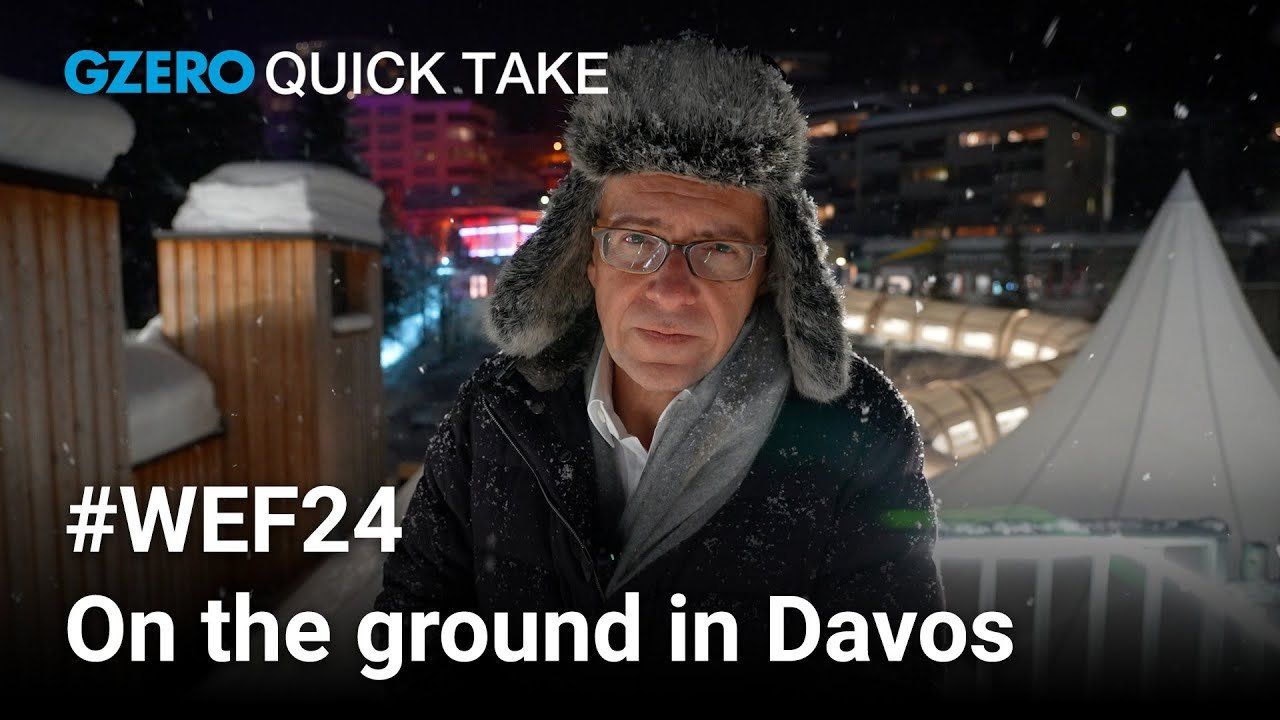Quick Take
Davos 2024: China, AI & key topics dominating at the World Economic Forum

Davos 2024: China, AI & key topics dominating at the World Economic Forum | Ian Bremmer | Quick Take

Ian Bremmer's Quick Take: Hi, everybody. Ian Bremmer here in Davos, Switzerland, for the kickoff of the World Economic Forum, 54th annual, though I haven’t been coming for quite that long. Lots going on here, of course, lots of concerns given ongoing wars as backdrop.
The big story so far, I would say, is that the Chinese are in force, 140 members of the delegation, ten ministers showing up, all with economic portfolios, and they want to engage. This is about a near state visit with the Swiss government, a trade agreement, and basically talking to a bunch of foreign direct investors, many of whom are saying, “Hey, we don't think you guys are so investible; we're going more into India and Vietnam and Mexico.” And the Chinese recognizing that they need to put up and make life easier for them. That has been interesting.
The Americans, especially the American government, very skeptical about all of this, of course, but in the near-term at least, don't have a major crisis, especially on the back of recent Taiwan elections. A lot of people are expecting a crisis there. Both sides trying to manage it. On the more negative camp, Ukrainian President Zelensky coming shortly. 83 states participated in an effort at some kind of peace negotiations just yesterday. Perfectly friendly meeting, absolutely no movement towards any diplomacy. The Russians aren't there, the Chinese aren't there, and the Ukrainians aren't going to accept anything that's remotely acceptable to the Russians as a party. What that means, of course, is that the Ukrainians are feeling increasingly desperate, that they need to make sure they get the support to defend themselves at a time that the Europeans are worried about spending the money and the Americans are divided about spending the money.
A little good news there, Senator Chris Murphy was supposed to be part of the big congressional delegation that comes to Davos every year from the US, didn't show up at the last minute. The reason is because they are working and making progress to get that additional budget deal done in Washington that would provide for some border security money, also provide for money, $60 billion for Ukraine, help them defend themselves in 2024. It's not what Trump wants to see, but he's not the Republican nominee yet, so the consequence is there is still movement.
Other final thing here that's getting a lot of a lot of attention is artificial intelligence. Of course, because it's the World Economic Forum, you mostly have people that are selling their new companies, but there's a lot of money behind them, a lot of enthusiasm. And unlike most flavor of the month type technologies, this is affecting pretty much every company in every sector here. So you can't go to a corporation or a bank and not have an AI related conversation as part of your bilateral. That's pretty interesting. 15 years of coming here, I've never seen anything like it. I'm kind of optimistic. Even though the technology is moving a lot faster than the governments.
Anyway, that's it kicking off this week at the World Economic Forum. I hope everyone is doing well, and I'll talk to you all real soon.
People in support of former South Korean President Yoon Suk Yeol rally near Seoul Central District Court in Seoul on Feb. 19, 2026. The court sentenced him to life imprisonment the same day for leading an insurrection with his short-lived declaration of martial law in December 2024.
65: The age of former South Korean President Yoon Suk Yeol, who was sentenced to life in prison on Thursday after being found guilty of plotting an insurrection when he declared martial law in 2024.
In an era when geopolitics can feel overwhelming and remote, sometimes the best messengers are made of felt and foam.
The Hungarian election is off to the races, and nationalist Prime Minister Viktor Orbán is facing his most serious challenger in 16 years.
Does skepticism rule the day in politics? Public opinion data collected as part of the Munich Security Conference’s annual report found that large shares of respondents in G7 and several BRICS countries believed their governments’ policies would leave future generations worse off.